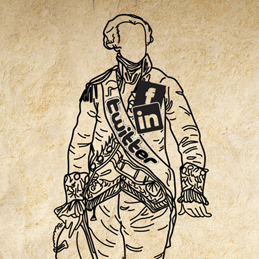LETTERS FROM THE GLOBAL PROVINCE
Behind The Times, Global Province Letter, 25 April 2012
I am not the editor of a newspaper and shall always try to do right and be good so that God will not make me one.----Mark Twain
Sunday Morning. We're sad, indeed, for our New York City friends who get their Sunday paper on Saturday night and have ripped through it before midnight. Much of this New Yorker's bible is down the garbage shoot in Manhattan apartments before dawn's early light, and to some extent Sunday is over before it began. This here- today- gone- yesterday half life is not unlike the evanescent train of 12-year-old girls we see lollygagging about in our cities, their faces plastered with remorseless cosmetics and their lips purring with sardonic phrases, the composite suggesting that their adolescence is over well before it ever got started. Sunday morning and sweet girls should move along at a tempered pace so as to allow fulsome memories and benign contentment to flower and flow.
 The Times, as best we can tell, is the greatest newspaper in the world, and is worth a vacilando and indolence and anything else that sets Sunday apart from the rest of the week. That's not to say that it does not have tremendous faults. Its political coverage has become indifferent. Just a few short years ago it had the best Science section, back when John Wilford, the occasional Science Editor, did telling pieces about space, about maps, and about the Loch Ness Monster. That's lost now. The Food Section, once without parallel when graced by Craig Claiborne, now is nondescript, and an anxious reader called me just a month or so back to wail, "The end is near, and the magazine food piece this Sunday had nary a recipe." Long gone, too, is the towering architectural coverage of Ada Louise Huxtable, who brought a wit and an urbanism to her writing lacking in her successors.
The Times, as best we can tell, is the greatest newspaper in the world, and is worth a vacilando and indolence and anything else that sets Sunday apart from the rest of the week. That's not to say that it does not have tremendous faults. Its political coverage has become indifferent. Just a few short years ago it had the best Science section, back when John Wilford, the occasional Science Editor, did telling pieces about space, about maps, and about the Loch Ness Monster. That's lost now. The Food Section, once without parallel when graced by Craig Claiborne, now is nondescript, and an anxious reader called me just a month or so back to wail, "The end is near, and the magazine food piece this Sunday had nary a recipe." Long gone, too, is the towering architectural coverage of Ada Louise Huxtable, who brought a wit and an urbanism to her writing lacking in her successors.
The New York Times Company is a poorly run business, and it has been floundering financially the last few years. More recently the web site of Britain's crummy Daily Mail has swept past that of The Times in popularity, hinting perhaps that the Times may not capture the value of its terrific web presence, something from which it stands to make a whole wad of money. As well, the last 3 editors or so have been rather average, leading to poor story selection, a lack of deep interpretation when the paper corners a good story, and the loss of leadership to other publications in areas where The Times was once cock of the roost.
Yet, with all of these caveats, this newspaper is still the greatest.
Sunday, April 22, 2012. After a stroll through the bulging, clematis-laden garden, a plate of melon and prosciutto laced with a Spanish hojiblanca olive oil, and a cuppa tea topped up with local, zip-code honey, one is ready for The Times, say by 10AM.
Unusually, this week, the front section is so good that one could skip the rest of the paper. There's an upper right blockbuster titled "Vast Mexico Bribery Case Hushed Up by Wal-Mart After Top-Level Struggle" that runs on for a full 3 pages inside the paper. In loving detail, it lays out the millions of dollars Wal-Mart has rained on all levels of government in Mexico in order to achieve utter dominance in that country's retail markets. Moreover, this Wal-Mart illegality and scandal down Mexico's way has infected all the top brass at Wal-Mart, reaching deeply into Bentonville.
What we must think through for ourselves are the broad implications of this article that go well beyond the bribery drama. The Times is unable to put this article in a global context. Wal-Mart is the world's most important company, and we learn here what it has had to do to spread its global web. What is apparent, moreover, is that Wal-Mart, and several other multinationals, cannot squeeze enough juice out of developed nations to keep sales and profits growing. They must invade underdeveloped nations, by whatever means, in order to sate their appetites. This ramp-up in poor economies will change the face of the globe during the 21st century.
Wal-Mart, as it happens, got its start in poorer, backwoods areas of the United States that were under-served and under-nourished: it knows how to flourish in regions where people are surviving by the skin of their teeth. Whether in backcountry Arkansas or in institutionally-stunted Mexico, it achieves dominance by literally obliterating local competition, employing practices that raise both ethical and legal questions. This is how Wal-Mart keeps growing in a low-growth world.
Wal-Mart, like many goliaths, is half saint and half sinner, something we emphasize in our Watching Wal-Mart section. It has brought cheap goods to a lot of people and has rationalized certain business processes such as supply chain management. But it has been hurtful, it seems, to many of its employees and has frequently driven down product quality. It is an open question as to whether it adds or subtracts from local, national, or international economies.
Alan Z. Feuer. Almost as long (2 pages) and almost as amazing is "His Double's Secret Life," which tells of a New York City poseur who went to society balls and blueblood parties and who claimed aristocratic Austrian forbears while affecting prosperity and polish. In fact, he was a down-at-the-heels, low-on-money fellow who grew up in Mount Vernon, New York and was the son of an émigré Austrian saloonkeeper. He was a counterfeit with imagined credentials.
He is just one of a horde of post-war counterfeits, many of whom have been stripped of their myths in the last few years. Several have pretended to wealth or noblesse, many have ginned up heroic war records, and so on. In this vein we never forget the novelist Clifford Irving who wrote a phony biography of Howard Hughes, even claiming meetings with The Howard when he was, in fact, off on a far-away vacation. Forgery of all sorts flourishes in a media-crazy society where people measure themselves by what gossips say about them and not by the quality of their accomplishments. Made-up people get more attention than self-made people. The TV/Internet culture fosters fantasy, and in so many cases, fantasy about one's own self.
 And we can joyfully even accept these frauds, as long as they do no particular harm. We particularly enjoy the reaction of Ivan Obolensky, "the one, true society don of Alan's world," who upon learning the truth about Feuer said, "God bless him. That's fantastic. Some people just need to be on deck, don't they? There's nothing wrong with that."
And we can joyfully even accept these frauds, as long as they do no particular harm. We particularly enjoy the reaction of Ivan Obolensky, "the one, true society don of Alan's world," who upon learning the truth about Feuer said, "God bless him. That's fantastic. Some people just need to be on deck, don't they? There's nothing wrong with that."
The New Times. The New York Times today is not at all about 'all the news that's fit to print.' For that we will have to look elsewhere. In fact, as its very long articles attest, it is very much less our newspaper of record, and ever more a feature magazine that gives us a rather amusing insight into our culture. It is cultural or social history.
P.S. The Los Angeles Times, of all places, does some innovative food stories.
P.P.S. April 20th also brought us a bemusing and probably worthy opinion piece on the editorial page by one Timothy Egan which we have elaborated on in Wit and Wisdom. It suggests that teetotalers make lousy presidents, and that there is hope at least for tipplers. That is, of course, why we have written so much about martinis, Manhattans, Bloody Marys, and the like.
P.P.S. The Times did a good but not great job on Levon (Mark Lavon) Helm, who died last week. He was a catalytic songwriter and drummer who powered the group known as The Band, was sort of the first citizen of Woodstock, and best exemplified the communal spirit of certain American musicians in the last third of the 20th century. The Times obituary appeared on April 20th, and it would have carried into the Sunday newpaper if the editors really knew what to make of him. On the other hand, the editors have endlessly belabored Dick Clark, a disc jockey and a music businessman, somebody whom they could better understand. Clark had become a media figure; Helm was always a musician. Our media can wax on ad infinitum about media creations but stumble over down-to-earth creatives. These days, obituaries often are the best essays in many publications, writings that no reader should miss.
P.P.P.S. We must ask ourselves anew about the role of the media in our society, especially since it has so cheapened itself. Curiously the proliferation of new media seems to have contributed to the polarization the country, as every network and every outlet cater to mere slices of the population. Truth and spirit suffer when a politician or a newscaster is willing to debase his voice to sate the worse appetites and biases of a few people.
P.P.P.P.S. At a wee age we read the New York Herald Tribune and the New York Daily News. Both had distinguished funnies, something the Times has never caught onto. Before it wrecked its Review of the Week section, it featured a clutch of pretty good social and political cartoons, but it now has a rather boring ideas section instead. The lively and literate paper in New York was, oddly enough, the old middle of the road Herald Tribune. New York City lost a lot of its joy when it folded. The ever lumbering Times is now more lively, but it has never learned about ecstasy. Neurosis, rather than giddiness, peoples its corridors.
Home - About This Site - Contact Us
Copyright 2012 GlobalProvince.com